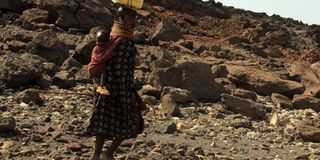Involve girls in family decisions, says study

A girl carries water from Lake Turkana on June 16, 2014. FILE PHOTO | JOSEPH KANYI |
What you need to know:
- Their exclusion condemns pastoral communities to a vicious cycle of abject poverty.
- Their triple challenge is their gender, age and geographical isolation that places them among the most marginalised
Exclusion of teenage girls in key family decisions on matters of food condemns pastoral communities to a vicious cycle of abject poverty.
A study by US-based charity Mercy Corps shows that teenage girls are there to be "disposed" for payment of dowry but their input, whether social or economic, is largely ignored as they are considered a liability.
The just released study, Wealth & Warriors: Adolescents in the Face of Drought mainly looked at the village life of teenage girls in the Turkana community and strongly recommends that the time has come when the girl-child must be given a chance to determine the family's next step in combating hunger, insecurity and poor education.
It says that pastoralist girls' triple challenge is their gender, age and geographical isolation that places them among the most marginalised. From a young age girls are groomed for marriage, with their value to the family determined by the livestock they will bring through dowry.
"They are domestic caretakers, income-generators and future brides and mothers precluding their ability to develop and realise their full potential as agents of resilience and change within their households and communities.
"Their place in society guarantees continuation of a cycle of poverty and marginalisation that persists from one generation to the next.
"Woe unto the teenage-girls when drought strikes as it depletes the family's livestock. What follows is 'disposal' of the teenage girl in exchange for livestock paid as dowry while boys are left in class," it notes, adding that more research needs to be conducted in this region so as to come up with major recommendations on policy change that could break the cycle.
Similarly, the delivery of health services must balance quality of services with appropriate outreach structures that respond to the needs of mobile populations, says the Mercy Corps study in Turkana County, Kenya, over a 15 day period April that saw researchers hold discussions with 40 focus group discussions, 87 semi-structured interviews in 20 village communities and key informant interviews from non-governmental workers and government representatives.
DECISIVE ACTION
The study recommends decisive action be taken to help teenage girls transition from practices such as early marriage and female genital mutilation and instead encourage them to advance their education as well as contribute in helping their families enhance their food security.
The study regrets girls are tasked with taking care of children, fetching water, washing clothes and cooking while boys start owning livestock right from birth.
"Livestock dictates the life of pastoralist girls who water and milk the cows but it is the household's male elder who 'owns' livestock, so defined by their authority to sell or slaughter an animal," observes lead researcher Sandrine Chetail.
The study also found that as drought continues to bite, girls are sent to the city to live with relatives where they seek work as domestic servants or engage in prostitution to meet their basic needs.
"Drought also sees resurgence of cattle raids to replenish livestock where boys engage in cattle rustling or defensive activities, facing the danger of being killed by bandits or attacked by wild animals while migrating with their herd.
"Unlike girls in pastoralist areas, teenage girls in other areas spend more time under 'normal' conditions as boys in school, have access to health and family planning services and are engaged in more diversified income-generating activities. This transition also provides more opportunities for increased decision-making power.
"They express a desire to work outside the home and community and aspire to career goals requiring completion of higher education," says the report, calling on policy makers, donors and local and international development organisations to consider working to increase food security and build community resilience in the Turkana region to liberate the girl child.





